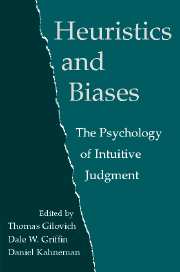Book contents
- Frontmatter
- Contents
- List of Contributors
- Preface
- Introduction – Heuristics and Biases: Then and Now
- PART ONE THEORETICAL AND EMPIRICAL EXTENSIONS
- 1 Extensional versus Intuitive Reasoning
- 2 Representativeness Revisited: Attribute Substitution in Intuitive Judgment
- 3 How Alike Is It? versus How Likely Is It?: A Disjunction Fallacy in Probability Judgments
- 4 Imagining Can Heighten or Lower the Perceived Likelihood of Contracting a Disease: The Mediating Effect of Ease of Imagery
- 5 The Availability Heuristic Revisited: Ease of Recall and Content of Recall as Distinct Sources of Information
- 6 Incorporating the Irrelevant: Anchors in Judgments of Belief and Value
- 7 Putting Adjustment Back in the Anchoring and Adjustment Heuristic
- 8 Self-Anchoring in Conversation: Why Language Users Do Not Do What They “Should”
- 9 Inferential Correction
- 10 Mental Contamination and the Debiasing Problem
- 11 Sympathetic Magical Thinking: The Contagion and Similarity “Heuristics”
- 12 Compatibility Effects in Judgment and Choice
- 13 The Weighing of Evidence and the Determinants of Confidence
- 14 Inside the Planning Fallacy: The Causes and Consequences of Optimistic Time Predictions
- 15 Probability Judgment across Cultures
- 16 Durability Bias in Affective Forecasting
- 17 Resistance of Personal Risk Perceptions to Debiasing Interventions
- 18 Ambiguity and Self-Evaluation: The Role of Idiosyncratic Trait Definitions in Self-Serving Assessments of Ability
- 19 When Predictions Fail: The Dilemma of Unrealistic Optimism
- 20 Norm Theory: Comparing Reality to Its Alternatives
- 21 Counterfactual Thought, Regret, and Superstition: How to Avoid Kicking Yourself
- PART TWO NEW THEORETICAL DIRECTIONS
- PART THREE REAL-WORLD APPLICATIONS
- References
- Index
16 - Durability Bias in Affective Forecasting
from PART ONE - THEORETICAL AND EMPIRICAL EXTENSIONS
Published online by Cambridge University Press: 05 June 2012
- Frontmatter
- Contents
- List of Contributors
- Preface
- Introduction – Heuristics and Biases: Then and Now
- PART ONE THEORETICAL AND EMPIRICAL EXTENSIONS
- 1 Extensional versus Intuitive Reasoning
- 2 Representativeness Revisited: Attribute Substitution in Intuitive Judgment
- 3 How Alike Is It? versus How Likely Is It?: A Disjunction Fallacy in Probability Judgments
- 4 Imagining Can Heighten or Lower the Perceived Likelihood of Contracting a Disease: The Mediating Effect of Ease of Imagery
- 5 The Availability Heuristic Revisited: Ease of Recall and Content of Recall as Distinct Sources of Information
- 6 Incorporating the Irrelevant: Anchors in Judgments of Belief and Value
- 7 Putting Adjustment Back in the Anchoring and Adjustment Heuristic
- 8 Self-Anchoring in Conversation: Why Language Users Do Not Do What They “Should”
- 9 Inferential Correction
- 10 Mental Contamination and the Debiasing Problem
- 11 Sympathetic Magical Thinking: The Contagion and Similarity “Heuristics”
- 12 Compatibility Effects in Judgment and Choice
- 13 The Weighing of Evidence and the Determinants of Confidence
- 14 Inside the Planning Fallacy: The Causes and Consequences of Optimistic Time Predictions
- 15 Probability Judgment across Cultures
- 16 Durability Bias in Affective Forecasting
- 17 Resistance of Personal Risk Perceptions to Debiasing Interventions
- 18 Ambiguity and Self-Evaluation: The Role of Idiosyncratic Trait Definitions in Self-Serving Assessments of Ability
- 19 When Predictions Fail: The Dilemma of Unrealistic Optimism
- 20 Norm Theory: Comparing Reality to Its Alternatives
- 21 Counterfactual Thought, Regret, and Superstition: How to Avoid Kicking Yourself
- PART TWO NEW THEORETICAL DIRECTIONS
- PART THREE REAL-WORLD APPLICATIONS
- References
- Index
Summary
I am the happiest man alive. I have that in me that can convert poverty into riches, adversity into prosperity, and I am more invulnerable than Achilles; fortune hath not one place to hit me.
Sir Thomas Browne, Religio Medici (1642)Imagine that one morning your telephone rings and you find yourself speaking with the King of Sweden, who informs you in surprisingly good English that you have been selected as this year's recipient of a Nobel Prize. How would you feel, and how long would you feel that way? Although some things are better than instant celebrity and a significant bank deposit, most people would be hard pressed to name three, and thus most people would probably expect this news to create a sharp and lasting upturn in their emotional lives. Now imagine that the telephone call is from your college president, who regrets to inform you (in surprisingly good English) that the Board of Regents has dissolved your department, revoked your appointment, and stored your books in little cardboard boxes in the hallway. How would you feel, and how long would you feel that way? Losing one's livelihood has all the hallmarks of a major catastrophe, and most people would probably expect this news to have an enduring negative impact on their emotional lives.
Such expectations are often important and often wrong. They are important because people's actions are based in large measure on their implicit and explicit predictions of the emotional consequences of future events.
- Type
- Chapter
- Information
- Heuristics and BiasesThe Psychology of Intuitive Judgment, pp. 292 - 312Publisher: Cambridge University PressPrint publication year: 2002
- 43
- Cited by

